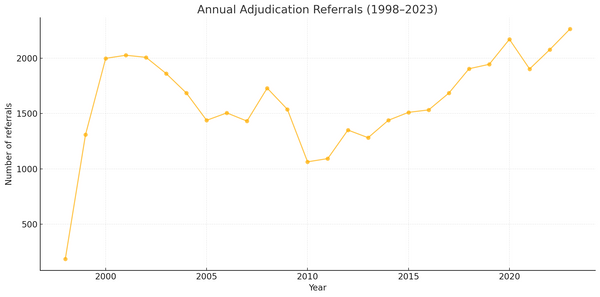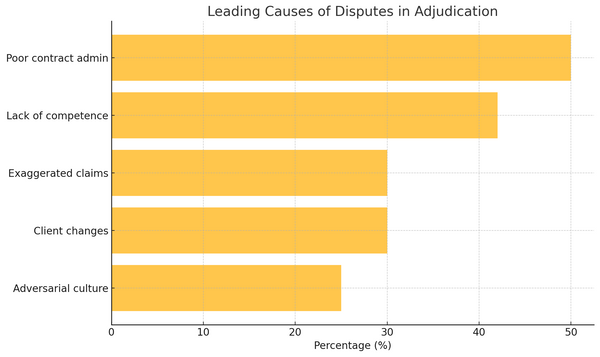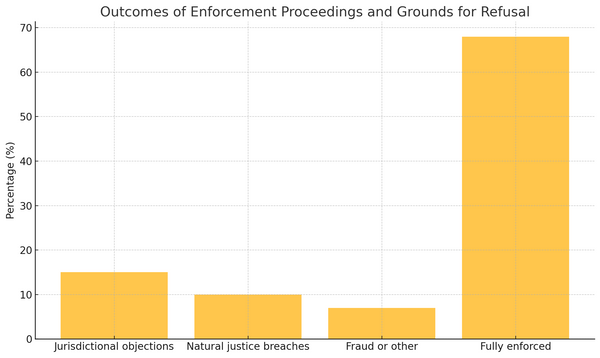

King's College London:
adjudication - Tracing Trends & Guiding Reform Report (2024)
(July 2025)
Introduction
The 2024 Construction Adjudication in the United Kingdom report, published by King’s College London in collaboration with The Adjudication Society, offers an authoritative overview of current trends and challenges in construction adjudication.
Building on data from ten Adjudicator Nominating Bodies (ANBs) and 166 industry professionals, the report highlights record referral numbers, evolving dispute patterns, and recent legal clarifications that shape the landscape. It examines key issues such as the prevalence of 'smash-and-grab' claims, the effectiveness and speed of adjudication, enforcement success rates, and ongoing concerns around diversity.
Now firmly embedded as the preferred mechanism for resolving construction payment disputes, adjudication continues to deliver rapid and pragmatic outcomes. However, the report also underscores the need for improved contract administration, greater inclusivity, and adaptation to emerging technological and legal developments.
A link to the report can be found here.
Key Findings from the Report :
📈 Adjudication usage and trends
-
Referrals to adjudication have reached an all-time high at 2,264 referrals in 2023–2024, continuing a steady upward trend.
-
Approximately 20% of these involved low-value or fast-track adjudications, illustrating increasing accessibility for smaller disputes.
-
'Smash-and-grab' claims (non-payment or late payment claims relying on procedural default) are the most common category, cited in 63% of cases.

⚖️ Nature and value of claims
-
The majority of claims fall between £125,000–£500,000 (42%), but there remains a significant volume of high-value claims above £500,000.
-
Leading causes of disputes include poor contract administration (50%), lack of competence (42%), exaggerated claims (30%), and adversarial culture (25%).
-
These findings suggest ongoing opportunities for barristers to advise on contract drafting, administration practices, and pre-emptive risk mitigation.


⏱️ Duration and procedure
-
Most adjudications conclude within 29–42 days; only 16% finish within the statutory 28-day period.
-
Extensions tend to be driven by complexity and party behaviour (the latter affecting 24% of cases).
-
This highlights the importance of prompt, well-prepared evidence and submissions to avoid delays and increased costs.

💰 Costs and fees
-
Median adjudicator hourly rates lie between £301–£350, with total adjudicator fees typically falling between £12,001–£14,000, but can reach £30,000 in more complex cases.
-
Cost considerations remain central, especially in advising clients on the proportionality of adjudication for smaller disputes.
🏛️ Enforcement and compliance
-
High compliance rates: in 52% of cases, no further litigation or arbitration follows adjudication; less than 5% proceed further in another 18% of cases.
-
In the TCC, 77% of adjudication decisions were fully enforced; partial enforcement in 3% of cases, and enforcement refused in 20%.
-
Grounds for resisting enforcement include jurisdictional objections (15%), breach of natural justice (10%), and fraud or other reasons (7%).
-
From a barrister’s perspective, these statistics reaffirm that challenges to enforcement are possible but remain exceptional and should be considered cautiously.

⚖️ Legal developments
-
Collateral warranties: Supreme Court clarified they are not generally construction contracts under the HGCRA unless they create separate obligations to perform works.
-
'Smash-and-grab' vs true value claims: Clarified you cannot commence a true value adjudication before paying a notified sum, even if a pay less notice is disputed, reinforcing the S&T v Grove principle.
-
Territorial scope: Definition of "England" for HGCRA purposes confirmed to extend to areas up to the baseline under the Territorial Sea (Baselines) Order.
💥 Insolvency
-
Low incidence of enforcement by insolvent parties (only 1%), though 18% of respondents participated in adjudications commenced by an insolvent party.
-
This remains a live tactical issue, particularly given recent jurisprudence on whether insolvent claimants can enforce adjudication awards.
🔮 Future directions
-
Rising use of adjudication beyond construction is being discussed, as is further digitalisation (including potential AI involvement).
-
There are open questions on how adjudication might adapt to future legal trends, especially if mediation use increases following Churchill v Merthyr Tydfil.
Conclusion
The 2024 report confirms adjudication’s vital role at the heart of UK construction dispute resolution. It highlights both its enduring strengths — speed, enforceability, and adaptability — and the areas demanding further attention, notably in diversity, procedural discipline, and contract administration standards.
For barristers, solicitors, adjudicators, and industry professionals alike, these findings underscore the importance of proactive risk management, robust contract drafting, and a continued commitment to transparency and inclusivity. The data not only informs current practice but also provides a blueprint for strengthening adjudication's effectiveness and legitimacy in a rapidly changing construction landscape.